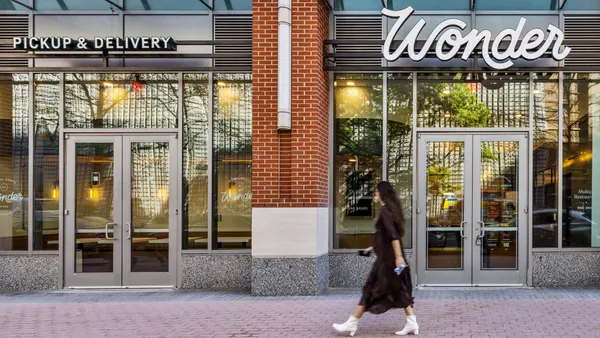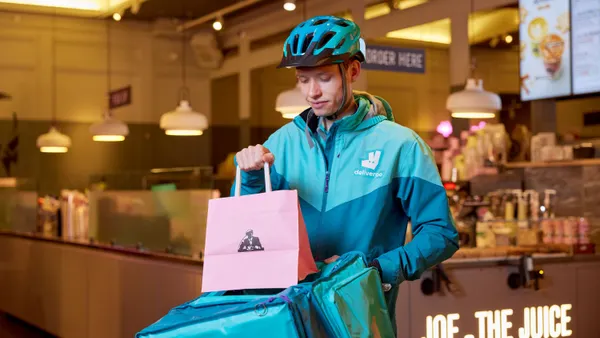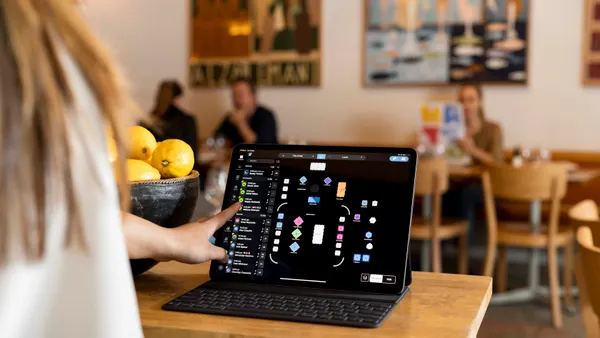Dive Brief:
- Sarah Friar, who has served as CFO of electronic payments company Square since 2012, announced this week that she is leaving the company in December to lead Nextdoor.com, according to a company release. Shares of Square dropped by as much as 15% upon the news, according to CNBC.
- Friar’s hire was well received among analysts and investors, according to Skift Table, and analyst Andrew Jeffrey said her leadership was more instrumental to Square’s emergence as a “true payments disruptor and impressive growth story” than even CEO Jack Dorsey.
- Square has evolved from a credit-card reader for street vendors into a payments and software tool for retailers across a number of verticals, including the restaurant industry. Since its IPO in late 2015, Square has more than doubled its value.
Dive Insight:
Square has been enabling small food vendors — such as food trucks — since its beginning, helping to level the playing field across the restaurant space in enabling ease of payments. The company held to that objective as it evolved into the world of omnichannel.
Omnichannel payments have emerged as one of the company’s major growth drivers. As Friar told Newsday recently, “Helping those entrepreneurs meet buyers wherever they are, whether it’s in your store, a popup, an ecommerce presence, a marketplace, a messaging app, something voice activated … We need to make sure small businesses can meet those buyers wherever they are in the same way that big businesses are approaching it.”
Friar often referenced the unique challenges food businesses specifically had to overcome to ensure convenient payments: “In food, people eat in my restaurant or stand in my café at lunch to buy their lunch, but then they might go on their app and order for delivery. They might go on their app and order for pickup," she told Quartz in an interview this summer.
This acknowledgment reflects Friar's role as a lead architect in Square’s restaurant strategy, which has consistently grown and now includes Square for Restaurants, a recently-launched POS for larger, full-service restaurants. During the company’s Q2 earnings call, Dorsey said this product can help restaurants “more easily manage operations so that service can spend more time delighting diners.”
So, while Square has long helped small restaurants compete on payments, the company has grown big enough to provide solutions across the entire restaurant industry. Notably, its Caviar platform for delivery and pickup services more than doubled its revenue year over year in Q2. Square for Restaurants, along with Caviar, Zesty (for catering) and Weebly (web design) illustrates that Square is creating a formidable restaurant payments and services platform. The restaurant business represented a quarter of Square’s gross payments volume in Q2.
Friar’s exit could potentially slow the company’s growth in this space. With Dorsey splitting his CEO duties between Square and Twitter, Friar has been a major visionary behind Square’s strategies. As the payment platform continues its rapid growth in the restaurant space, the company would be wise to hold to Friar’s omnichannel priority, especially as delivery, catering and carry out continue to grow.
The runway is long in this space. Square, for example, estimates there are 21 million small and medium-sized businesses in the U.S., and they combine to generate around $6 trillion in revenue. In 2017, gross payment volume across Square's platform totaled just $56 billion, which means Square captured 1.8% of what it sees as its potential market, according to The Motley Fool.
If Square misses a beat upon Friar’s departure, it could provide an opportunity for the busy payments category to catch up. PayPal’s recent acquisition of iZettle, GrubHub’s purchase of LevelUp and Uber’s collaboration with Barclays and Green Dot are just a few potential threats. Ultimately, restaurant customers are likely to benefit from any increased competition in the payments space as innovation and growth continue.













